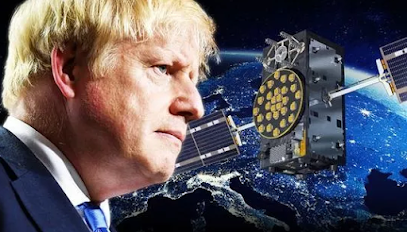As has already been proven with the Brexit end-of-transition negotiations, anything with EU in the title has been like a red rag to the Tory right, which has used its disproportionate influence to persuade the prime minister cut off as many ties with Europe as possible, beneficial or not.
There are many examples, including the ERASMUS student scheme and perhaps even Galileo itself, the European satellite navigation system in which the UK has played such a significant role.
The politically skewered view that the UK could just go ahead and build its own multi-billion pound replacement to Galileo was, in reality, just more jingoistic hot air to serve the “sovereignty above all else” headlines.
Like so many post-Brexit negotiating decisions, the loss of high-level access to the navigation satellite system was a politically driven position - a government, huffing and puffing to leave and failing to consider rationally what was the country’s best interest.
The UK's final big industrial contribution to the EU's Galileo sat-nav system was delivered before Christmas after Guildford-based Surrey Satellite Technology Limited (SSTL) shipped the last of the navigation payloads, which are described as the "brains" of the spacecraft generating the signals the Galileo network sends down to Earth.
Britain’s "third country" status now means UK companies can no longer be involved in the hi-tech end as they once were because Galileo is regarded by the EU as a security programme and only firms in its 27 member states or those with separate agreements can take on sensitive work.
Of course, like many things with Brexit, it didn’t have to be like this. Norway, for example, which is not an EU member, negotiated itself an agreement giving access to Galileo’s high-level signals and the ability to supply sensitive hi-tech instruments.
A savvy UK government, not driven by political ideologies, could easily have achieved the same had it wanted to rather than erect another trade barrier, this time in “space”, of its own choosing.
So, given the UK’s somewhat intransigent and often seemingly ill-thought out positions of late, the EU’s consolidation of its space programmes may not be to Britain’s long term advantage.
The European Global Navigation Satellite Systems Agency (GSA), which acts as the technical and procurement agent for the EU's space projects, will be renamed the EU Agency for the Space Programme (EUASP).
As such, it will also take on managing the use of the Copernicus Earth observation satellite system and oversee new initiatives in satellite communications named GOVSATCOM and space situational awareness (SSA).
The Prague-based agency will continue to manage use of the European Global Navigation Satellite Systems (GNSS), European Geostationary Navigation Overlay Systems (EGNOS) and Galileo satellite navigation programmes.
According to a European Commission (EC) press release last week, EUASP “will increasingly support the exploitation and market uptake of EU space activities, and play a bigger role in ensuring the security of all the components of the programme.”
EU Internal Market Commissioner, Thierry Breton, praised the reorganisation of the union’s space programmes. “Europe is the second space power in the world. But the global race is on,” he said.
“With this agreement, we now have the means to develop our leadership in space by consolidating our flagships – Galileo and Copernicus – and exploring new initiatives that will enhance Europe’s resilience, notably in secure connectivity.”
The EU has a seven-year space budget of €13.2 billion ($16 billion) up to 2027 and most of these funds will be focused on operating and expanding the Copernicus and Galileo satellite systems. The European Space Agency (ESA), of which the UK remains a part, oversees technical aspects and development of the spacecraft.
EUASP will also oversee the new European GOVSATCOM that is designed to provide reliable, secure and cost-effective satellite communications for the EU and its member state governments.
In addition, the agency will be instructed to manage a new Space Situational Awareness (SSA) programme designed to help prevent collisions of objects in Earth orbit and uncontrolled reentries from this increasingly over-crowded environment. The programme will also focus on monitoring space weather and near Earth objects.
So, despite remaining part of ESA, which at least for the time being will give the UK an on-going role in the Copernicus programme, it remains to be seen what effect the EU’s increasing involvement in the organisation of European space programmes will have.
Allied with the UK’s irrational desire to cut off as many ties with the EU as possible, will it ultimately be to the detriment of UK involvement and leadership of this hi-tech and lucrative industry?
Over the coming months, and years, such matters will go much deeper than the “temporary” disruptions and difficulties that are now becoming more and more evident by the day for firms and traders at UK borders.
The term 'Long Covid' has become increasingly familiar as the Covid-19 pandemic has progressed. Sadly, if previously vibrant and successful UK industries suffer the very
practical fallout of misplaced political ideology and British
exceptionalism, it may not be long before 'Long Brexit' becomes a thing too.
* * *
Editor's note: thanks to Prof Chris Grey for the acknowledgement and mention in his Brexit & Beyond blog on 22 January 2021, and the suggestion that the term Long Brexit has better parity with Long Covid by dropping the hyphen.







